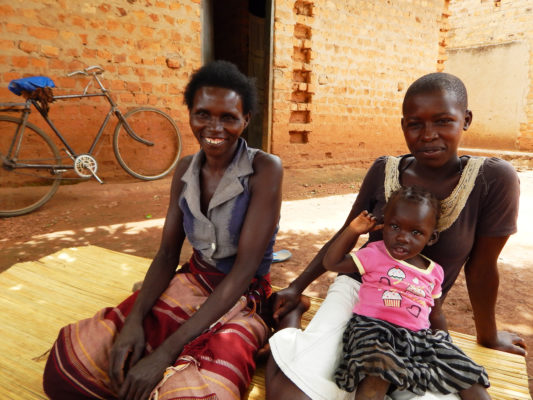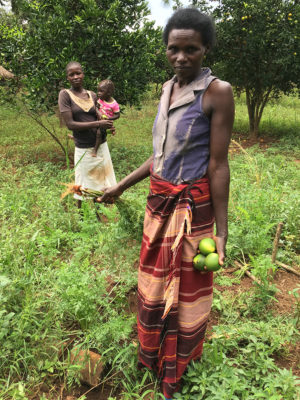BETTER Opportunities for a Young Mother and Her Family
Rose* is an 18-year-old girl living in Alibi A village in Loro Sub-county of Oyam District in Uganda. Rose lives with her mother and her 14-month-old baby.

When Rose finished primary school, she was accepted and enrolled in secondary school. She failed to transition, however, because her father—who was an angry and desperate man who was often very rude to her mother—refused to pay her school fees. Rose recalls, “I saw my other friends go to school. When I asked my father for the school fees, he was so bitter to me. He went to my mother, who wanted me to go to school, and he was very angry. He even denied he was my parent. He said he would rather use the money for a prostitute instead of paying for my school fees.” Angry and desperate, Rose’s father told her to just wait and then left for another village. Six months later, he returned only to tell his wife that he was leaving the family for another woman.
“After all that, I was so bored and lonely at home. I had no one to talk to except one boy who would come and chat with me. We had dated while I was in school, but we never had sex. After all this, I needed a shoulder to lean on. So, I accepted having sex with him. He never told me to go back to school. He did not even care.”
When she was nearly 16-years-old, Rose got pregnant. When she told her boyfriend, he disappeared.
In March of 2016, BETTER OUTCOMES-trained para-social workers (PSWs) told Rose about Girls First Clubs during a community sensitization session. Based in the community, Girls First Clubs create safe spaces for out-of-school girls to come together; discuss and brainstorm solutions to the issues facing them in their lives; learn together about how to protect themselves from abuse; understand and address their risk to HIV; access health services; and support and encourage one another to set goals and strengthen relationships with one another, their families and other trusted adults in their communities. Facilitators are trusted adults who reside in communities where girls live and use a participatory process to draw on girls’ strengths while also introducing critical life skills and other information. Girls are also encouraged to speak out in the communities around the issues that are important in their lives to build support for their goals and needs.
Rose describes her emotions at the time, “I was so lonely. I used to think about negative things in my life. I thought I was useless. I thought, ‘Maybe I should just be an animal and live in the bush because I had no purpose. Maybe I should just die.
“[After joining the club,] I now have friends who support me in my community. I can speak to people in the community now without feeling shame. And as a young mother, this is very important to me. I have learned about HIV/AIDS and how to prevent HIV. I realized why I was at risk of HIV. After we were encouraged by the Club facilitator, I decided to go to the health facility and get tested for HIV. Fortunately, I found out that I am negative.”

“And since I learned I’m HIV-negative, and I know my risks, I am committed to staying away from those things that threaten me. I also know how to take better care of myself. I feel better about myself, that I am useful to myself, my baby, and my society. I really want to go back to school, even while managing my baby, and now feel confident. I know going back to school will be a great opportunity for me. I knew I had to talk to my mother about looking after my child while I am in school. She even came to my home to talk to me and my mother about this. Eventually, my mother accepted. And for now, I don’t want to meet a boyfriend so I can focus on myself, my studies, and my baby.”
To help build economic resilience for the family, BETTER OUTCOMES team members encouraged Rose and her mom to join a program-supported savings group. To earn money for school and basic family needs, Rose farms and her mother manages a small business selling products from her small farm. She says, “I have learned a lot. It has helped me buy basic needs for the family. I, at least, can now buy soap. We all now look smart because our clothes are clean! And I also have brought back some money to my business to support our farms.
Rose’s mother also enjoys the savings group, “We save and talk about finances, but we also discuss issues like child protection and keeping proper hygiene in our homes as single mothers. It keeps my mind fresh, sharing ideas with one another.”
Both Rose and her mother continue to receive regular visits by the BETTER OUTCOMES PSW and Girls First Club facilitator. Rose still wishes to learn another marketable skill so she can expand her business opportunities and save more money, as she knows she will have to stop working when she re-enrolls in school. Her mother agrees, but also encourages her by promising that she will continue to support her and her baby in the future.
The Better Outcomes for Children and Youth in Eastern and Northern Uganda project provides critical HIV and social protection services to 15,000 families and 90,000 children across 20 districts in eastern and northern Uganda.
